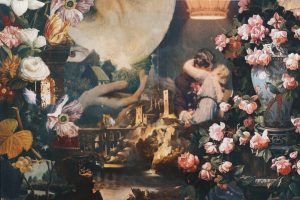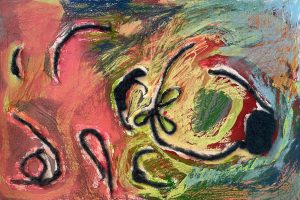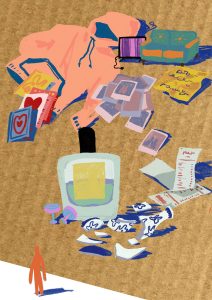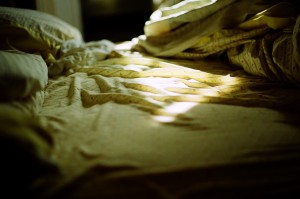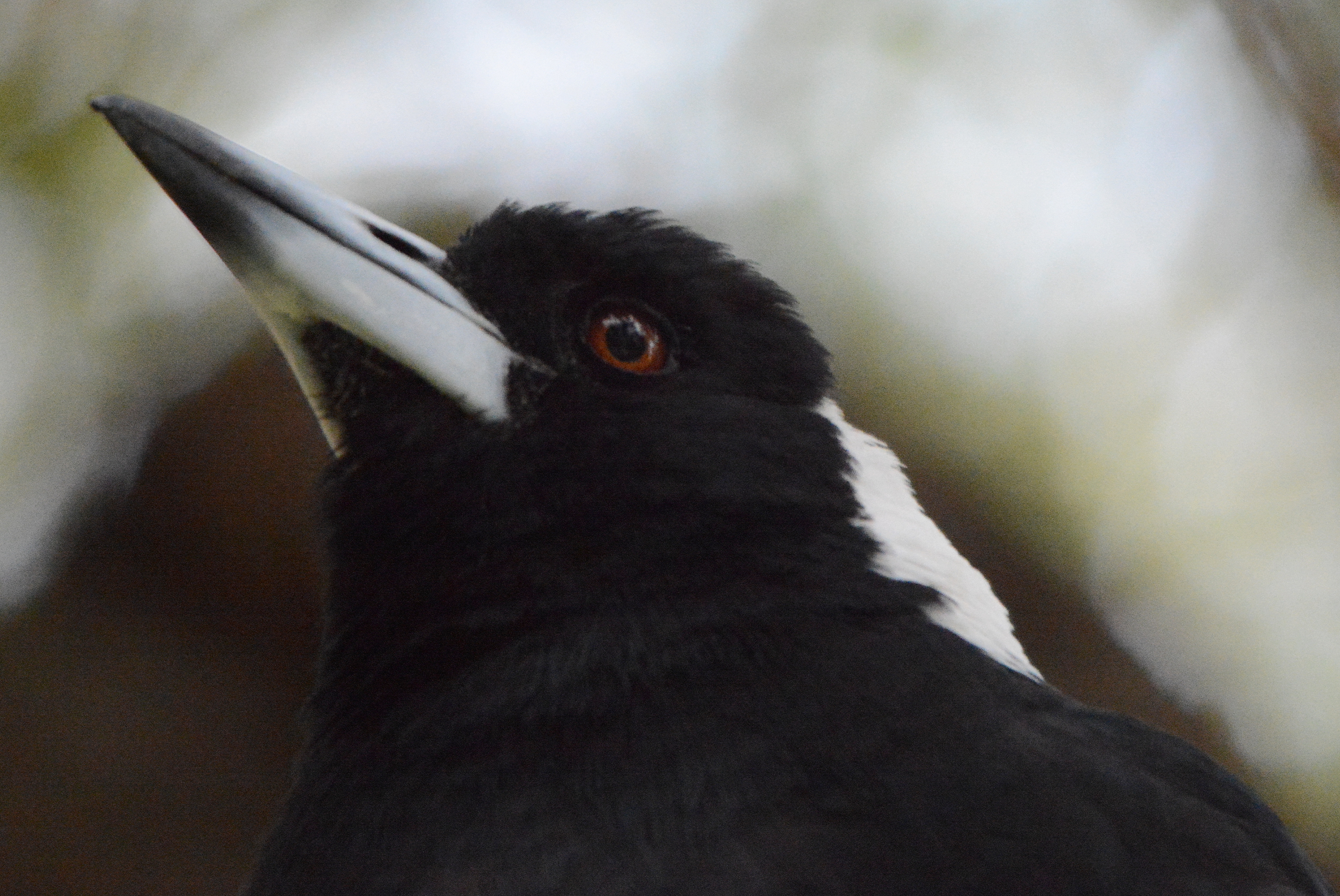
Magpie
by Isabella Sophie | July 9, 2019
In the hallway, I can feel the walls breathing. Furniture is sparse, and the woodwork is mahogany. There is a framed map of Canada to my left. Through the window above the staircase, a shard of sun pierces the room and lands squarely on a vase of oriental lilies, bathing them in a quiet yellow light.
Almost instantly, I hear the scratching. My heart is a hummingbird’s wing now. As gently as I can, I tread on the floorboards— imagining the balls of my feet sinking into warm animal flesh as I draw near. The doorknob is within reach; I look on as I wrap my hand around it.
I close my eyes.
Then open them again.
****
Springtime in Maroville. Outside, the morning light is still fragile, and a veil of mist has wrapped itself around the day. The entire city is painted in an insipid wash of ink.
The phone rings and it’s Jonathan Landry, editor of The City Slicker.
“Guess who’s got an assignment for you, Fran?!”
I feel a sting of apprehension. My eyes shoot up toward heaven.
“This one’s for you, trust me. I have a cousin down south—Mike. You’ve heard me mention Mike, right?
No time to reply:
“Anyways, sometime last week he was passing through this strange town en route to Winnipeg— Drislow, you call it. Population of around three thousand or something—trees everywhere—”
A pause:
“Alright”
“Well, he sent me this email about some lady who lives there—Margaret Gaulden. Says she’s famous down in Drislow for writing people these weird letters. And if one of these letters arrives on your doorstep, then God help you because whatever ol’ Maggie commands, the townspeople gotta obey— no questions asked.”
I crinkle an eyebrow:
“So, do we know why?”
“That’s what I want you to find out for me, Fran. Can you head down there? Like as soon as you can? Mike says the locals are super cagey—no one wants to talk about Maggie.”
“I guess I could. But I—”
“Ready for the best bit?” Jonathan says, nearly bubbling over, “There is no one by the name Margaret Gaulden in Drislow— I double-checked the consensus, myself: she doesn’t exist. Our readers’ll just eat this thing up, y’know? But we need more info—obviously.”
“I’d need to come up with an angle.”
“Whatever works, Fran—I’m leaving it up to you.”
I allow myself a half-smile.
“I’ll talk to the locals and see if I can get anything out of them. I could head sometime the week after next?”
“Great—I’ll let you do a bit of groundwork, then. Just keep me posted, okay?”
“Sure.”
“Gotta go, Fran.”
“Bye, Jonathan.”
****
The train is a silver comet rattling along the Red River. From my rear carriage seat, I can see golden swathes of canola flower fields and emerald sheets of white spruce. It is late April and I am Drislow-bound, gazing into a blur of wild splendour as the sky ripens to a furious blue.
I arrive at Crowe’s Cottage just after midnight. My home for the next week is haggard and beautiful with two floors, a crumbling veranda and a thatched roof. All four front-facing windows are rimmed in vivid strokes of red and the walls are pebble dashed and painted alabaster, like the skin of an Elizabethan socialite.
With a brain full of static, I slam the car door shut and walk along gravel toward the entrance, eager to turn in for the night.
I am only a few steps from the veranda and realize I am being watched.
At a round table in a blackened corner of the porch sits a young man who casts me a look of dim hostility through the shadows. He gulps down a final sup of amber liquid before hitting the glass on the table with a thud.
I nod and step inside.
Behind the counter, I find a man with hair whiter than a flash of electricity polishing an already gleaming wine glass, staring all the while into a blue haze of television light. I pause, slide my backpack from my shoulder, and use my free arm to hoist the load onto the stool nearest me.
Just enough to break the spell.
My host turns to face me—his right temple dotted with an archipelago of age-spots; his cheeks fibrous hollows of pumpkin meat.
“Good evening, Madame”
“Hello,” I say, “I called earlier in the week to book a room. I spoke with a woman— I believe she said her name was Daphné?”
Setting down the glass and searching through the reservations book:
“Very good. Yes, uh Daphné is my wife. Tac-tac…”
He lands his index finger on a page and traces the words briefly before looking up again:
“I’m Vincent— welcome to Crowe’s Cottage. Your name?”
“Thanks. It’s Fran Casey.”
Vincent’s face tightens.
“You’re the journalist?”
“That’s right.”
He shuts the book calmly:
“I’ll just go get my wife. One moment, please.”
I look after the old man as he lumbers over to the other side of the bar and pushes twice on an electric bell fixed to the wall. Above our heads, there is a distant thud and the sound of straining floorboards.
Daphné emerges at the bottom of the staircase looking flushed, with cheeks that have assumed the aspect of blotchy apple skins.
“Good evening!” she chimes upon seeing me. “You must be our journalist!”
I try and fail to match her exuberance:
“That’s me”, I say with a tired smile. “It’s good to meet you in person”.
Daphné grins as she shuffles past Vincent whose attention has been reabsorbed by the television:
“And you, my dear. Now, let me show you to your room— you must be exhausted after your trip.”
Daphné stoops beneath the countertop and pulls out a red tin box.
“Vos clés, Madame”, she says with mock regality, presenting me with two keys bound together by a brown leather fob.
****
In the dining area the next morning, a young girl of no more than sixteen with braided hair is laying down two brimming pitchers of cranberry juice on an extended table near the back wall. It is almost quarter to nine and the room is empty of guests. When she spots me, the girl’s face contorts to an impish, crumpled grin. She immediately stops what she is doing, wipes her hands on her apron, and bounds toward the bar where I am stood.
“You must be Cassandra,” I say, “Daphné mentioned you work here on weekends.”
“Almost everyone calls me Cassie, though,” she beams, “Are you here for food? I can show you our cooked breakfast menu if you’d like?”
I look around again at the back table and see an assortment of cereals, fruit and yoghurt pots:
“Oh, that’s alright, thanks— can I just get something from the table?”
“Sure! Grab whatever you’d like and take a seat wherever—this place has been dead all morning.”
I seize my chance:
“So, the inn’s pretty quiet at the moment?”
“Well, we’ve got Ronnie and her daughter Jess who are visiting from Vermont,” Cassandra says, “they arrived a couple of days ago and are staying the whole week, but I guess you won’t have met them yet—Daphné mentioned you only got here yesterday.”
“Late yesterday evening,” I agree.
“Then there’s Joan, Louise and Martha— now there you have three women who know how to have a good time. Once or twice a year they come down here to get away from their husbands—or to give them a much-needed break, I’d say. Daphné calls them ‘The Shrinking Violets’”.
“I like that,” I say, smiling, “so who else you got here?”
“That’s just about it”, Cassandra replies.
“What about the man I saw drinking on the porch last night—isn’t he a guest here?”
Cassandra looks confused for a moment, then her eyes gleam with recognition:
“Nah— that’ll be Timmy Robbins. He’s the town’s handyman— he’s got no family in these parts, so a lot of his time is spent at Crowe’s. Actually, he’ll probably be along sometime today—he usually stops by for breakfast on Saturdays.”
I am on the verge of asking about Maggie when a cackling gaggle of pensioners hobble into the room, flinging back their heads like little baby birds wailing for food.
Cassandra shoots me a knowing look and spins around to greet them. I take this as my cue to go get breakfast.
From my table, I watch as the Shrinking Violets settle in and place their orders. Cassandra retreats to the kitchen at the bottom of a narrow corridor and, by the time she returns, skilfully carrying two plates and balancing a third on her forearm, I am done eating and have already made up my mind that Joan is the leader of the pack, and Martha, the lovable kook.
Cassandra delivers the keenly anticipated food to the women before returning to my table:
“I hope they’ve not been disturbing you too much,” she says with a hint of genuine exasperation, “I’d better have that much energy when I’m their age.”
“Not at all,”, I say, “they’re actually pretty entertaining.”
Cassandra’s face breaks into a smile as the front door opens. From just behind me, I hear the thud of heavy boots on the old carpet.
As discreetly as I can, I glance over my shoulder and am met by the stony gaze of Timmy Robbins: skinnier now than I remember him and wearing a knitted toque.
“Just bring me out my usual, Cassie,” he says without looking away from me.
“Sure thing,” Cassandra says, and I watch her head back to the kitchen without another word.
The door closes and look to my side at The Shrinking Violets who have already resumed their conversation, though this time more composedly than before.
I get up and walk outside to where the playful afternoon light has newly resurrected itself from behind the trees.
There he is, the object of my attention: a gloomy cigar-smoking silhouette sat in the exact spot where I had seen him the night of my arrival. Apparently fixated upon an invisible object in front of him, Timmy is wearing navy overalls unbuttoned far enough to reveal the letters “REDEN” and a slice of John Fogerty’s head.
I smile as Jonathan’s perennial words of wisdom ring in my mind:
“Find the humanity, Fran”.
“You’re a fellow Creedence fan, then,” I say nonchalantly.
My friend looks up at me then down at his chest:
“It’s just an old shirt.”
“Mind if I sit?”
Without waiting for consent, I pull out a rickety chair and settle in— quickly turning my attention to Timmy’s paint-encrusted hands.
“I hear you’re a handyman in these parts— work going well?”
“Pretty steady right now.”
“You paint too?”
“Not usually”, he sighs “there’s an old barn over on Blake’s we’re fixing up.”
He’s softening already, I think. Like butter in a pan.
“Listen, I gather you know a lot of pe—”
I’m interrupted mid-pounce by Cassandra who has rushed out carrying a white mug, a plate of toast and a larger plate stacked high with pancakes and bacon rashers.
She places the meal in front of Timmy who immediately sets about wolfing down its contents.
With a steady gaze, I watch my interviewee slice, hack and swallow loudly until, at last, he turns to me with new, unveiled eyes.
“I just want to know more about Maggie Gaulden,” I say coolly, “I know about the letters. When did all this start?”
“Maybe five or six months ago.”
“So, a letter from Maggie winds up on the doorstep of someone from the village asking them to do something—then what happens?”
“That’s not how it works,” he says abruptly, “a letter can end up on your doorstep, but it’s always addressed to someone else”.
Sensing my confusion:
“Look, the last one that turned up at my place was for ol’ Selwyn Halliday. The letters always start out with a person’s name and a request from Maggie—like the one I got last time: it said, ‘Maggie Gaulden requests an amber-preserved water beetle from Mr. S Halliday’s collection’”.
I squint my eyes and try to nod encouragingly:
“Selwyn got owly about the whole thing. He used to work in a museum and spent most of his life collecting dead bugs and other kinds of crap, so he wasn’t all that happy about having to hand over his beetle.”
“Why did he, then?”
“It’s a tradition round here now is all.”
I wonder if I should take the notebook out of my bag, but think better of it.
“Alright,” I say, fumbling for my bearings, “so you get a letter from Maggie that’s addressed to someone else—then what?”
“Then we gather here at Crowe’s.”
“We?”
“Yeah, every time a letter shows up, word gets around and then basically the whole town comes here to find out who’s up next. That’s just how it works.”
The bluntness of this last utterance makes me feel like Philippe Petit, walking untethered along a high-wire.
I watch Timmy as he shifts his weight in the chair and begins digging for something in the pocket of his overalls.
He places a note under the plate and gets up to leave:
“That’s all I know.”
****
“Don’t mind him,” Cassandra says to me, her big eyes reservoirs of empathy. “He can be a real lump of grump to people he’s never met before.”
“Oh, it’s not so bad,” I say, “he answered a couple of the questions I had.”
Cassie smiles amenably as she gathers together the items left on the table. Glancing up at her, I wonder how much she knows:
“These get-togethers you have here at Crowe’s,” I begin, “Timmy mentioned them, but I wanted to ask you what happens exactly? Do you go?”
“Oh, yeah! Well I’m working tomorrow night, so I’ll just stick around to see what happens. I haven’t heard about who Maggie’s been writing to this month so…”
Cassie’s voice tapers off when she sees the look on my face:
“You didn’t know?”
“Not about tomorrow night,” I say, “what time will people get here?”
The girl picks up the little pyramid of ceramics and slips Timmy’s note inside the front pouch of her grey and navy-striped apron:
“I guess from eight… I mean, I think that’s what Vince said. But I could be wrong. He’s the one who answered the call this time anyways, not me.”
“What call?” I ask gently.
Cassandra’s face assumes the wide-eyed panic of a shackled cow. She turns away and begins walking toward the door:
“Oh, it’s just that folks in Drislow are supposed to call reception at Crowe’s when they get a letter,” she says over her shoulder, “so we can arrange a get-together, is all— I’ll go wash these up now.”
She gestures toward the dishes in her hands before retreating into the dining area.
****
Not long after eight the following night, I leave my cabin room and head for the cottage.
Looking on as rivulets of people stream into reception, I single out a few unsuspecting targets to interview.
An hour passes.
The sound of a hundred flies assembled on a carcass.
I ask questions. Time slips away.
The air is tar.
More time slips away.
Daphné looks at Vincent:
“Looks like no letter tonight, folks.”
****
It is five years ago, and I am returned to a body that is light with laughter.
“You have really surpassed yourself this time,” I say between convulsions, “that has got to be the most grotesque tank top I have ever seen in my life.”
Emerging victoriously from one of the beach’s portable toilets, Ash smiles defiantly, arching back his shoulders and lifting his chin like a Roman Emperor. Amid a cartoonish tallgrass prairie, complete with birds on one side and a stream on the other, shine the words: “WELCOME TO WINNIPEG— THIS IS ONE GREAT CITY!”
“What’s the verdict then, Fran?”
I squint my eyes, unable to fathom the full horror of the scene.
“Well, for a start it’s orange,” I say, regaining my composure, “and brighter than anything that exists in nature.”
“I know,” Ash beams, “another stellar holiday purchase, eh?”
This is a tradition of his—to hunt out the most obscure souvenir shops around, then buy anything he considers suitably ridiculous. It’s a propensity that saw us fumbling our way through a labyrinth of beachballs, postcards and healing crystals a half hour ago.
When Ash found what he was looking for, his eyes ignited.
“I don’t think I want to get married anymore, actually,” I say on the beach, “you definitely weren’t this uncool when we met.”
“Maybe if I get a tattoo of your face on my bicep, that would really compliment the vest—and look cool.”
“That’s the final nail in the coffin”, I say, and am brought back to the present with a crippling jolt.
****
Seated at the cabin room’s dressing table, I flick dispassionately through the pages of my notebook.
Witnessing the arrival of a new letter would have been exactly the type of breakthrough I need—something tangible and newsworthy.
As it stands, though, I only managed to talk to a few people with stories to tell. There was the artist named Layla who, as my scrawled handwriting documents, received word of a letter from Maggie several weeks ago. In her letter, a request was submitted for a windchime—the kind made by Layla in her studio using seashells and broken shards of coloured glass.
Leafing through the next two pages, I am reminded again of George Harold—the elderly clockmaker who, upon Maggie’s request, parted ways with a display box exhibiting the intricacies of an old pocket watch.
I close the book and set it aside, deciding I am too exhausted to stay awake any longer. Outside, the rain taps gently on my window.
When I see the letter— I stop in my tracks.
The white envelope laying at the foot of the door wasn’t there a moment ago.
I pick it up and tear it open.
The words are dazzlingly stark: I read them a second time:
“Maggie Gaulden requests the company of Ms. F. Casey.”
The letter falls to the floor as I race to the window and throw back the curtains—
There is only the night.
****
The crudely drawn map on the back of the letter leads me deep into the thicket behind the cabin.
All around me are dream-like trees that reach out with arthritic fingers as I walk along a carpet of vegetation and skeletonised leaves.
I knew last night that I would tell no one at Crowe’s about the letter, choosing instead to walk for miles alone until the soles my feet ache, pausing only to consult the map:
“500 more metres as the crow flies.”
A last morsel from Maggie.
Straight ahead, the forest floor is lit like a shoal of glimmering water. As I walk along, I hear the rustlings of several creatures in the canopy above, wildly emboldened by the scent of rotting earth.
Then, at the clearing, I see it: a tall cigarette burn looming quietly behind a gossamer of mist. The house, with its gabled roof and dusty windows, looks out onto a carpet of twigs and debris that snap underfoot as I approach the threshold.
Maggie’s house.
The morning’s pink-flushed sky disappears behind me and I climb the steps to the house’s porch. I knock three times on a wrought-iron door dripping with ivy—
But no occupant is conjured.
I try again and am satisfied. There had been no mention of time made in the letter—was Maggie somewhere else today?
Almost unconsciously, I give the door a tentative push.
To my horror, it opens— and I step inside without hesitation.
In the hallway, I can feel the walls breathing. Furniture is sparse, and the woodwork is mahogany. There is a framed map of Canada to my left. Through the window above the staircase, a shard of sun pierces the room and lands squarely on a vase of oriental lilies, bathing them in a quiet yellow light.
Almost instantly, I hear the scratching. My heart is a hummingbird’s wing now. As gently as I can, I tread on the floorboards— imagining the balls of my feet sinking into warm animal flesh as I draw nearer. The doorknob is within reach; I look on as I wrap my hand around it.
I close my eyes.
Then open them again.
The room, much like the rest of the house, is gaping and bare-boned. There is only the open window and a pale, disused hearth. Residing purposefully in the middle of the room, sits a blue velveteen chair, and—in the chair—there is a woman.
The woman’s face is long and narrow and topped by a woolly patch of hair, more lilac than grey in this light. Her cracked skin is pale and marshmallowy and the underside of her chin is gleaming with a star-speckled wash of green and coral, owing to a string of jewels around her neck.
Maggie.
Draped in swathes of back fabric, Maggie looks out around the room with bespectacled eyes that are quick and curious and pinched in at the corners like an amiable rat.
Scratch, scratch, screech.
As though oblivious to my presence, the woman withdraws her gaze from the rafters and gets up off the chair. Crossing the room towards an open bird table, she digs for something in her pocket.
Suddenly, a flurry of black and white feathers descends from the ceiling and alights theatrically on the bird table, beating the air with its wings and hopping from foot to foot.
Maggie casts a tilted palm over the painted tabletop and the bird sets about pecking the newly dispersed seeds.
“I have never liked this bird,” the woman says reverently, her voice thick and gurgling.
I stand motionlessly, waiting for an excuse to crystallise.
“She won’t leave, though. One day she flew in through the window, and now she won’t leave.”
The woman and the bird look at each other knowingly.
“This is Dolores—she lives here now.”
The flame-eyed magpie— recognising its name—cocks its head to one side and the room falls quiet.
“I came to ask you about the letters,” I blurt, “you wrote one for me.”
A nod of confirmation.
“I wasn’t sure if you were ho—”
“You want to ask me about my letters?” Maggie asks.
“Yes.”
“I’ll tell you anything you want to know.”
I see then what I hadn’t noticed before—the treasures lying all along the mantelpiece: Selwyn’s water beetle, Layla’s windchime, George’s dismantled clock, a silver thimble, a miniature rocking horse, a music box—and a neat stack of parchment paper:
“I want to know why.”
Maggie smiles and paces over to the window:
“The first time Dolores flew back out of this window, I thought she’d gone for good… but she came back with a quartz pebble in her beak, and the next time she had a key.”
I look now to the bird who has flown back into the rafters.
“The third time she came back with a yellow bead. She looked so pleased that I picked up my pen, thought up a new name, and wrote my first letter. It gave me something to think of.”
I remember Selwyn Halliday and wonder how kindly he would take to this whimsicality:
“Doesn’t it upset people to part with their things?”
Maggie’s little eyes disappear into her face and a metallic laughter fills the room:
“You’re thinking about Selwyn!” she chortles, “Oh, that man had it comin’!”
“How’s that?”
“Well, you’d really have to get to know him—and that, I wouldn’t recommend.”
I can’t help but smile.
“Anyway, most people don’t mind my letters—and I never ask for something you can’t give. It’s just one or two who make a fuss—and I have Timmy to help with that… he was the one who put the letter under your door, you know? And he keeps that Vincent on his toes—Vincent and I haven’t seen eye to eye for as long as I can remember.”
I take a step toward the window and see that Maggie is looking down onto a little plot of soil where green and waxy coils are sprouting:
“My grandson takes care of me.”
At last I feel the pieces of the puzzle fitting together:
“But why the gatherings at Crowe’s?” I ask, “Why not just have the letters delivered to the right people?”
“Where’s the fun in that?!” Maggie demands with wicked relish—
And the treasures on the mantlepiece glimmer in the light.
****
In the days following my return to Maroville, I have thought often about the woman in the cold room. The woman who hadn’t wanted Dolores, or invited her in, but who—in her wicked, defiant way—had learned from the bird the value of hunting for small treasures.
This instinct, I decided, was the life-sustaining taproot of existence—
As vital to a human as to a magpie. ∎
Words by Isabella Sophie.
